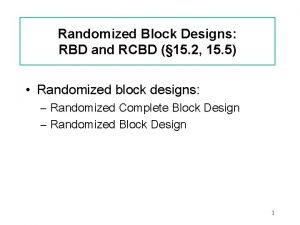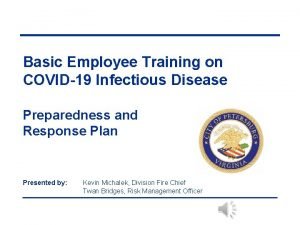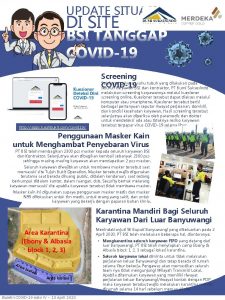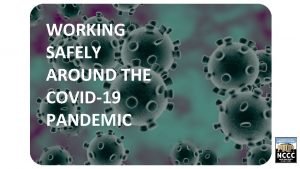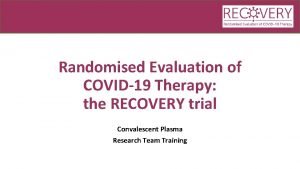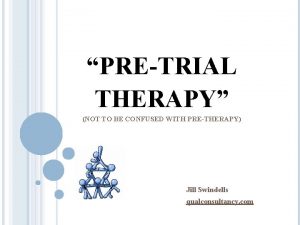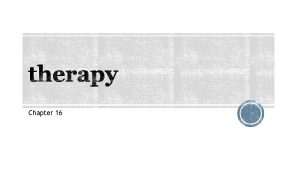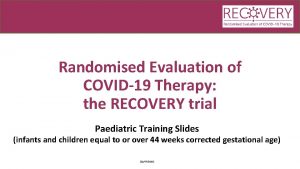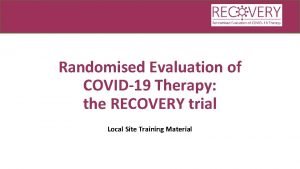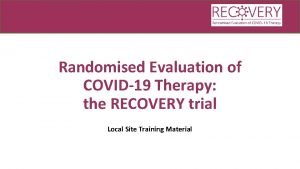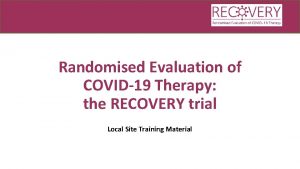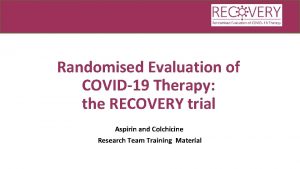Randomised Evaluation of COVID19 Therapy the RECOVERY trial









- Slides: 9

Randomised Evaluation of COVID-19 Therapy: the RECOVERY trial Aspirin and Colchicine Research Team Training Material

Current design early immunomodulation A Colchicine + usual care or Usual care alone AND/OR R ↓O 2 + ↑CRP No additional treatment antibody-based therapy B Convalescent or plasma REGNCOV 2 m. Ab or Usual care alone AND/OR anti-thromboembolic therapy C Aspirin + usual care R 2 or Usual care alone ↑ O 2 OR ↓ CRP OUTCOMES ELIGIBLE PATIENTS Tocilizumab

Colchicine • Colchicine inhibits spindle formation in neutrophils and NRPL 3 inflammasome activation • Used routinely as an anti-inflammatory for gout and pericarditis • Increasing evidence of its benefits in cardiovascular disease e. g. postmyocardial infarction or chronic coronary artery disease

Colchicine • Dose in RECOVERY is: • 1 mg after randomisation • 500 mcg 12 hours later • 500 mcg twice daily thereafter for a total of 10 days (or until discharge if sooner) • Colchicine can rarely cause cytopaenia so full blood count monitoring is recommended (frequency at clinician discretion e. g. 3 and 7 days after randomisation)

Colchicine: Contraindications • Colchicine is teratogenic in animals so must not be given to women of child-bearing potential • Women <55 years old will be excluded from this arm by the randomisation form • Older women who might be pregnant need to be informed • Colchicine is contraindicated in presence of: • Severe hepatic impairment • Significant cytopaenia (neutrophil count <1; platelet count <50; reticulocyte count <20 [if measured]) • Concomitant use of strong CYP 3 A 4 or P-gp inhibitors • Hypersensitivity to lactose

Colchicine: Cautions • Colchicine can be used in the following conditions, but dose frequency could be reduced (i. e. 500 mcg daily rather than twice daily) • Moderate CYP 3 A 4 inhibitor • Reduced kidney function (e. GFR <30 m. L/min/1. 73 m 2) • Estimated body weight <70 kg • If >1 of these present, investigator should consider excluding colchicine from randomisation (i. e. mark as “unsuitable”)

Colchicine: Adverse effects • Main adverse effect is diarrhoea which may limit tolerability • Cytopaenias are rare

Aspirin • Commonly used antiplatelet agent with anti-inflammatory properties • Dose in RECOVERY is 150 mg once daily for duration of admission • Contraindications: known hypersensitivity; recent major bleeding risk considered too high • Side-effects: bleeding

Aspirin FAQs Q Why 150 mg? A Potential risk of underdosing larger patients with 75 mg and bleeding risk little different Q Should we give a PPI with aspirin? A Gastroprotection can be used at the discretion of the treating physician Q What about other VTE prophylaxis? A Other VTE prophylaxis (e. g. heparin) should not be modified by allocation to aspirin or control
